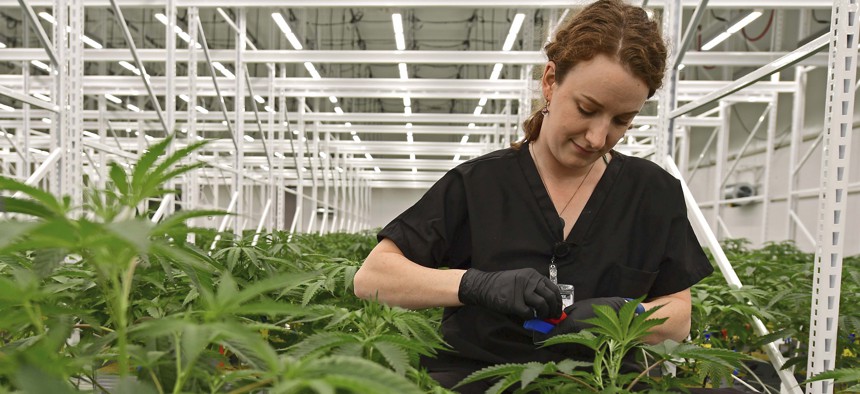Counting Jobs in the Marijuana Industry

An employee of Buckeye Relief LLC, sorting the male and female marijuana plants inside a Veg Room, Thursday, Sept. 20, 2018, in Eastlake, Ohio. AP Photo/David Dermer
Private groups try to fill gaps in official employment data.
With federal jobs figures for the state-legal marijuana trade in short supply, some independent groups are taking a crack at a count.
Marijuana website Leafly and consultant Whitney Economics issued a jobs report for the legal cannabis industry this week that suggests there are about 211,000 jobs now tied directly to the sector.
They say that this figure is higher than the 69,000 brewery workers and 112,000 textile manufacturing employees in the U.S. And that it's up from about 120,000 in early 2017.
Pot is now legal for medical use in 34 states and for adult recreational use in 10 and in the District of Columbia. But it is still deemed to be an illegal drug under federal law.
U.S. Reps. Tulsi Gabbard, a Hawaii Democrat, and Don Young, an Alaska Republican, introduced legislation on Thursday that would relax how pot is classified and allow states to regulate it as they see fit.
"This is a bill that solves the problem," Young said during a press conference. "Get the federal government out of it."
"Let states run it," he added.
The lawmakers also introduced a bill to study the effects of state marijuana programs by looking at related topics, including employment, as well as areas like state revenues, public health and criminal justice.
Alaska is among the states where adult recreational pot use is legal. Hawaii was one of 21 states where lawmakers considered legalization bills last year, the National Conference of State Legislatures says.
Nationwide, annual legal marijuana sales have increased to around $10.8 billion, up from abut $6.7 billion in 2017, according to the report Leafly published this week.
On the marijuana jobs front, California, Washington and Colorado led the pack among states with legal weed, with about 47,800, 33,500 and 31,400 jobs respectively in January, the report says.
It notes that Florida, where voters approved a medical marijuana measure in 2016, has seen jobs in the industry rise to around 10,300 from about 1,290 at the end of 2017.
State legislators in Tallahassee this week were taking steps to repeal a ban on smokable medical marijuana. A law enacted in 2017 to implement the ballot initiative legalizing medical marijuana had restricted users to oils and edible goods.
Pennsylvania has also experienced medical marijuana job gains, with employment growing from fewer than 100 workers in late 2017 to around 3,800, according to estimates in the report.
The authors of the report note that Michigan, where voters passed a ballot measure last year to legalize marijuana for recreational use, is poised to see sizable growth in the cannabis industry.
They also offer some examples of pay in the business, which runs the gamut from $11.50 to $14.50 per-hour "trimmer" jobs, to "director of cultivation" positions with six figure salaries.
A Bureau of Labor Statistics spokesman said by email Friday that the agency has limited data on marijuana production and sales, which are included in its quarterly census of employment and wages database.
But it's tough to gain insights from the data because it's lumped into broader categories.
For instance, jobs growing marijuana crops are included in an agricultural production data series for "all other miscellaneous crop farming." And both recreational and medical retailers fall under an "all other" group for the retail trade sector.
The Leafly report acknowledges some state-level efforts related to coming up with jobs numbers. But the website says work in this area has been hampered by the classification system for labor statistics in North America, which doesn't account for the marijuana industry.
A full copy of the report can be found here.
Bill Lucia is a Senior Reporter for Route Fifty and is based in Olympia, Washington.
NEXT STORY: Artificial Intelligence Now Helps People Find Jobs






